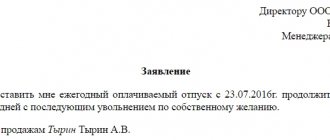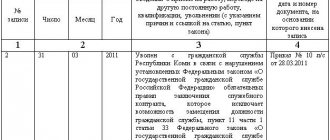Upon termination of the employment relationship, the organization is obliged to make a full settlement with the employee and issue all necessary documents and funds. Financial assistance upon dismissal can be provided to any employee. This payment is not mandatory, but is additional, therefore it is accrued to the employee only if certain conditions are met.
What is financial assistance and when is it paid?
Important! Financial assistance is not a regular payment; otherwise, it is classified as monetary incentives with all the ensuing consequences.
The possibility of receiving financial assistance and its size do not depend in any way on the factors that would influence the amount of salary - experience, qualifications, knowledge, skills, etc. Management is approached for such a payment in the event of a difficult financial situation (in the event of a fire, illness of a child, theft, death of a relative, and other cases). The law does not oblige employers to agree to payment; the employee may be refused. If the opportunity to receive financial assistance is important to the applicant, you should discuss this point with the employer in advance. Payment terms may be reflected:
- in the employment contract with the employee;
- in the collective agreement of the enterprise or other local act.
Important! Only the presence in an employment or collective agreement of a clause on the payment of financial assistance upon the occurrence of certain conditions guarantees that the employee will receive payment. If financial support is not mentioned in any of the company’s local regulations, the employer is not required to make payments.
If the manager is ready to accommodate the dismissed employee, he issues a separate order indicating the exact amount of financial assistance and the date on which the payment must be made.
For military personnel
When a serviceman is discharged, he is provided with financial assistance, the amount of which depends on many factors, including military rank and current salary. A person may be deprived of a monetary payment if:
- is currently at the disposal of the commander;
- was stripped of his rank;
- by a court decision, the serviceman was held accountable in the form of imprisonment;
- the court issued a decision on suspended imprisonment for an act that was committed intentionally;
- was expelled from an educational institution for military personnel due to non-compliance with discipline, poor academic performance or lack of desire to continue further education;
- was deprived of the right to receive military positions for a certain period of time by a court decision;
- the conditions specified in the contract are violated or not fulfilled;
- was deprived of the right to receive information related to state secrets;
- a court decision was made on suspended imprisonment for an act that was committed through negligence;
- did not pass the test for other reasons specified in the contract.
If at least one of the above conditions is present, the serviceman is deprived of the right to receive financial assistance.
Read on the topic: Dismissal of a military pensioner at his own request
Read on the topic: Military mortgage and dismissal of a serviceman
Is an employee entitled to financial assistance upon dismissal?
Upon dismissal, several different payments may be made, each of which could be regarded as financial assistance. Depending on what kind of payment we are talking about, the employer provides financial support on his own initiative and at his own discretion, or under duress of the law:
| Type of payment | A comment |
| Monetary incentive based on the results of a specified period of time (year, quarter, month), in other words - a bonus. | If such a payment is approved by any local company regulation, the employer is obliged to make it. Otherwise, the employer does not have to pay anything. If an employee is fired before the payment time, the amount of the bonus is determined by the number of days worked or in another manner accepted by the company. |
| Severance pay. | It is mandatory to pay if the dismissal occurred at the initiative of the employer, but the employee did not commit disciplinary or other violations. |
| Severance pay in case of bankruptcy and liquidation of a company. | It is a mandatory payment, and is accrued to the employee in a fixed amount, in accordance with the provisions of Article 81 of the Labor Code. |
| Penalty upon dismissal by agreement of the parties. | Often, the employer offers the employee a certain amount of money as compensation for early termination of the employment relationship. The amount of compensation is established by the decision of the manager and is indicated in the agreement on termination of the employment contract. |
| An additional payment requested by the dismissed employee due to his difficult financial situation. | If the employment or collective agreement does not mention such payment, the employer has the right to refuse, especially if dismissal is due to guilty actions on the part of the employee. |
The procedure for conducting negotiations to include conditions for financial assistance in the collective agreement
According to Part 1 of Art. 36 of the Labor Code of the Russian Federation, both representatives of workers and employers can participate in negotiations with the aim of adopting collective agreements or agreements. Each of the negotiating parties has the right to initiate the procedure.
During the discussion, a collective agreement may be adopted, which stipulates the employer’s obligation to pay financial assistance to employees who resign at their own request. Payment conditions may also be fixed, i.e. certain criteria, if met, financial assistance will be paid.
The more detailed the text of the document is, the easier it is to control its execution and the clearer the conditions for receiving funds by an employee of the enterprise. In the future, clearly defined conditions for receiving financial assistance help prevent possible disputes and difficulties in interpreting these provisions.
A proposal to negotiate is sent from one party to the other in writing. In this case, negotiations must begin within 7 days from the date of receipt of the proposal (Part 2 of Article 36 of the Labor Code of the Russian Federation). If the employer avoids negotiations, administrative liability may be imposed on him under Art. 5.28 Code of Administrative Offenses of the Russian Federation.
The procedure for the negotiations themselves is determined by Art. 37 Labor Code of the Russian Federation. There are no strict requirements for the procedure. The parties are given the right to develop provisions for how negotiations are conducted, so the procedure may differ depending on the specific organization. A special commission is formed and a draft agreement is developed. The agreement is accepted no later than 3 months from the start of negotiations.
Financial assistance upon dismissal of one's own free will
Important! If an employee leaves his job due to moving to work in another company, as a rule, he is not entitled to financial assistance, since he will immediately begin receiving a salary at the new place of work.
If an employee writes a letter of resignation for any of the following reasons (when 14 days of work are not required), the employer may, at its discretion, pay him a certain amount of money as a reward for conscientious work:
- upon retirement due to age;
- due to deteriorating health and assignment to a non-working disability group;
- due to the serious illness of a family member in need of care;
- in other cases that are prescribed by management in the collective agreement of the enterprise.
The payment amount in such cases is usually calculated as a percentage of the salary. If the dismissal was initiated by an employee who accepted a better offer from another employer, he can only write a statement asking him to help him with money (see sample statement). The employer will consider the reasons for such an appeal, determine the amount to be paid and the date of transfer of funds. But he has the right not to pay money.
Results
Thus, financial assistance upon dismissal can be paid at the initiative of the employer, on the basis of an application from the resigning employee or an internal memo from his immediate superiors, as well as on the basis of the provisions of local acts, collective agreements and agreements in force in the organization.
This is important to know: Can a father with many children be fired from his job?
At your own request
One-time payments are not regulated by the Labor Code of the Russian Federation. Most employers are not interested in such payments if the employee, on his own initiative, decides to terminate the employment relationship. On the other hand, such encouragement may influence the decision of the person leaving to withdraw his application.
Some organizations pay financial assistance to employees who, during the performance of their job duties, have made a significant contribution to its development. When terminating the contract at his own request, the employee can draw up a written request for payment of mat. help.
Moreover, he can indicate its size independently. If the decision is positive, an order will be issued to pay it.
Reasons for issuing financial aid:
- forced dismissal due to caring for a sick relative;
- retirement;
- other conditions reflected in the document regulating labor relations or regulations of the organization.
If the provision of financial assistance is reflected in the company’s regulations or employment contract, then upon dismissal it must be paid.
Is it possible to receive financial assistance for vacation?
Sometimes organizations provide one-time incentives to their employees. Its size can be fixed or equal to the salary. If an employee is dismissed who has not worked for a full 12 months, the payment of financial assistance remains at the discretion of the head of the organization.
They provide social and incentive assistance. Social has nothing to do with work responsibilities. It does not relate to labor costs, therefore, it is not subject to tax. Provided upon written request from the employee.
An example of calculating financial assistance upon dismissal
The employer, according to the company’s collective agreement, pays employees one-time financial assistance for vacation in the amount of 16 thousand rubles. The employee worked for 8 months, and therefore wrote a letter of resignation from work. Payout calculation:
8 months : 16 months = 0.5 – part of the year that was worked;
16,000 rub. x 0.5 = 8,000 rubles – payment;
8,000 rub. x 13% = 1040 rubles – personal income tax withholding;
8,000 rub. – 1040 rub. = 6,960 rubles – payment in hand.
Order to issue financial assistance to a resigning employee
After receiving and reviewing the relevant document from the employee, the employer must issue an Order to transfer funds to the person. There is no established form for drawing up an administrative document; the rules for its preparation depend on the internal requirements established in the organization. The Order must indicate:
- The name of the employing company in which the employee carries out his labor activity;
- Registration number of the Order;
- Date of document execution;
- Information about the employee who is provided with financial support;
- The amount of financial assistance and the basis for its calculation;
- The order of the boss on the need to issue these financial resources to the employee is indicated;
- The procedure for transferring financial assistance to a person in need;
- Indication of the deadlines before the end of which funds must be transferred to the employee, as well as the person responsible for the execution of this order;
- List of documentation that is attached to the Order;
- Personal signature of the supervisor of the resigning person;
- Company seal, if available.
After sending this Order to the accounting department, its specialists transfer financial support to the employee within the specified time frame.
No rating yet
Common mistakes
Error: Financial assistance upon dismissal is indicated in the collective agreement as an incentive payment for the period of work. The employer does not withhold personal income tax and insurance premiums from payments.
Comment: If material assistance is of a social nature, personal income tax and insurance contributions are not paid. If the payment is of an incentive nature, deductions are required.
Error: The employer paid the employee money as one-time financial assistance of a social nature. The employee soon quit, and the employer withheld this amount from his salary.
Comment: The list of possible deductions from salary is given in Art. 137 Labor Code of the Russian Federation. In this case, deduction is prohibited.
A memo as a basis for payment of financial assistance
The memo is also drawn up in any form and contains similar details:
- information about the head of the organization to whom it is submitted;
- information about the person submitting the memo;
- information about the employee who may be paid financial assistance, including his full name and position;
- name of the document (service memo);
- request for payment;
- indication of the payment amount;
- signature of the employee's supervisor;
- date of writing the note.
The note is most often drawn up by the immediate supervisor of the resigning employee, but can also be written by any other person who is applying for payment of financial assistance to the resigning employee.
Answers to common questions
Question No. 1: Should an employee pay personal income tax on the amount of financial assistance upon dismissal?
Answer: No, financial assistance does not apply to the wage fund, and therefore no taxes are required to be paid on it - neither by the employee nor by the employer.
Question No. 2: Is financial assistance included in the amount of money taken to calculate the average earnings of a dismissed employee?
Answer: No, financial assistance should not be taken into account when calculating salary, benefits and other payments related to work activities.
Rate the quality of the article. Your opinion is important to us:
Municipal employees
Upon dismissal of a municipal employee, monetary payment is provided only if it was enshrined in legal acts in the given territory. Its size is calculated individually. In addition, a cash payment may be provided in the event of special circumstances, for example, in connection with the death of a close relative. The person must indicate this fact in the appropriate application.
Financial assistance is not a mandatory payment and is provided only at the request of the employer. However, the employee may send an application to the director requesting a monetary payment. To receive a positive answer, it is recommended to indicate reasons that will confirm the need to receive financial assistance. The amount of payment is set individually for each employee.









